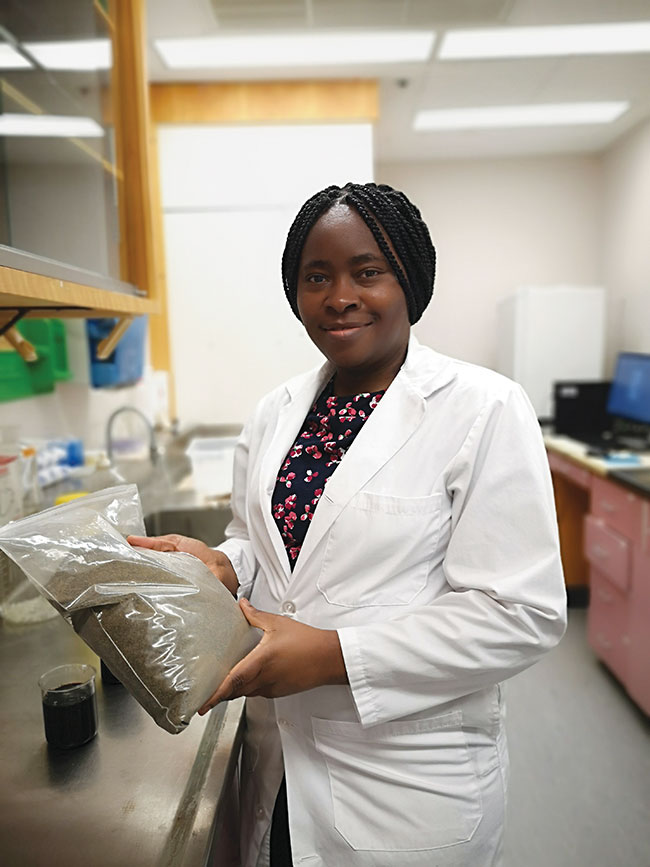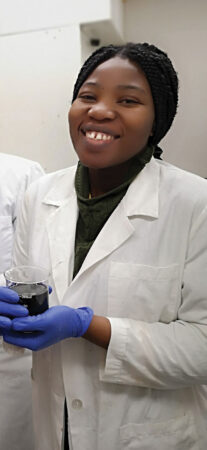
Helping broilers handle heat stress
By Jane Robinson
Features HealthSeaweed shows potential as additive to broiler diet.
 Dr. Deborah Adewole, pictured here, and her PhD student Fisayo Akinyemi are researching the potential for brown seaweed to combat the negative effects of heat stress in broilers.
Photos: Dr. Deborah Adewole
Dr. Deborah Adewole, pictured here, and her PhD student Fisayo Akinyemi are researching the potential for brown seaweed to combat the negative effects of heat stress in broilers.
Photos: Dr. Deborah Adewole Healthy birds handle stressors better, including those associated with rising temperatures from climate change. And as the industry reduces the use of antibiotics in poultry production, researchers continue to develop alternatives to help reduce bird stress including the use of novel ingredients with known properties related to improving bird health.
Dr. Deborah Adewole and her PhD student Fisayo Akinyemi are researching the potential for brown seaweed to combat the negative effects of heat stress in broilers. Adewole is an Assistant Professor and holds the Industry Research Chair, Poultry in the Department of Animal Science and Aquaculture at Dalhousie University.
“One of the reasons we singled out brown seaweed is because we know it has good antioxidant properties that help birds build a stronger immune system to withstand many types of stress,” Adewole says. “We wanted to see how we could use it as a feed ingredient to help birds cope with heat stress.”
Seaweed is already used as a feed ingredient in animal diets, and a local seaweed producer that first approached Adewole about adding it to poultry diets – in one of the first studies to look at brown seaweed in broiler diets for heat stress.
Testing two forms
A group of day-old broilers were divided into two rooms and raised for a total of 28 days at the Atlantic Poultry Research Centre. From days 21 to 27, birds in one room were subject to heat stress for eight hours a day. Birds in the other acted as a control group. Birds in both rooms were also divided into four treatment groups – a control group, a group with one mL per litre brown seaweed extract liquid added to the drinking water, one with two mL per litre brown seaweed extract in the drinking water, and a group with two per cent brown seaweed meal added to the feed.
Data was collected on growth performance of the birds including weight gain, feed intake and feed conversion ratio. Blood samples were tested for antioxidant status between the various diets, as well as indicators of immune status and stress.
The research yielded some surprising and expected results, depending on the form of seaweed included in the broiler diet.

PhD student Fisayo Akinyemi with brown seaweed extract.
Meal boosts growth performance
Birds fed brown seaweed meal in the feed had better growth performance that those given the extract in the drinking water but didn’t deliver antioxidative effects. “We saw a significant increased in weight gain and feed intake for the broilers fed two per cent brown seaweed meal, compared to the control diet that had no significant difference in these measures,” Akinyemi says.
The growth improvements were the same for the birds fed the meal whether they were subjected to heat stress or not. “When we analyzed the diet with two per cent brown seaweed meal, there was more fibre in this diet and that is what boosted the birds’ growth performance,” Akinyemi says.
This wasn’t really a surprise result for the researchers as they expected the additional fibre in the diet from seaweed meal would be beneficial. “The added fibre contributed to overall gut health that helped birds deal with stresses, including from heat,” Adewole says.
Improving gut function with added fibre acts to improve feed efficiency. “More fibre in the diet improves the function of the gizzard to break down fibre, and in turn help birds use feed more efficiently for growth,” Adewole says.
But what they didn’t see was any bump in antioxidant activity or reduction in heat stress by adding the seaweed meal to the feed. “This may be a factor of the amount of seaweed included in the diet,” Adewole says.
Extract helps reduce heat stress
Adding the extract in a liquid form to drinking water showed promise for helping mitigate the negative impact of heat stress. One of the benefits was in reducing liver enzyme levels in the blood. “We found that enzymes indicating liver damage due to exposure to heat stress were lower in the broilers fed the extract,” Akinyemi says. “This would indicate the extract may help reduce the negative impact of heat stress.”
There was some improvement in growth performance with extract but not as much as feeding the seaweed in meal form.
A good start on seaweed
With these results, Adewole is confident that seaweed has a role in mitigating heat stress in broilers, but there is more work to be done. “This is a preliminary study and it shows the potential benefits for adding brown seaweed,” Adewole says. “I would like to see another study to conduct this work on a larger scale before we could make any concrete recommendations for producers to add this ingredient to broiler diets.”
Looking at gut health
Adewole and Akinyemi are continuing their work on seaweed in the second part of this project. “We are looking at the effect of brown seaweed on the gut health of broiler chickens,” Adewole says. “We are still working on this project and hope to find that feeding the seaweed meal, especially, improves the gut development and helps the birds absorb nutrients better.” Results from this part of their research is expected later this year.
Print this page